5非谓语动词作宾语的归纳
非谓语动词作宾语的四种类型
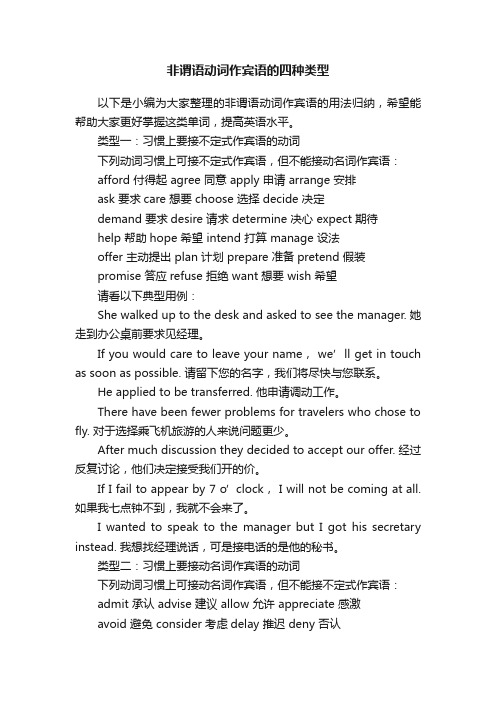
非谓语动词作宾语的四种类型以下是小编为大家整理的非谓语动词作宾语的用法归纳,希望能帮助大家更好掌握这类单词,提高英语水平。
类型一:习惯上要接不定式作宾语的动词下列动词习惯上可接不定式作宾语,但不能接动名词作宾语:afford 付得起 agree 同意 apply 申请 arrange 安排ask 要求care 想要 choose 选择 decide 决定demand 要求desire 请求 determine 决心 expect 期待help 帮助hope 希望 intend 打算 manage 设法offer 主动提出 plan 计划 prepare 准备pretend 假装promise 答应refuse 拒绝 want 想要 wish 希望请看以下典型用例:She walked up to the desk and asked to see the manager. 她走到办公桌前要求见经理。
If you would care to leave your name,we’ll get in touch as soon as possible. 请留下您的名字,我们将尽快与您联系。
He applied to be transferred. 他申请调动工作。
There have been fewer problems for travelers who chose to fly. 对于选择乘飞机旅游的人来说问题更少。
After much discussion they decided to accept our offer. 经过反复讨论,他们决定接受我们开的价。
If I fail to appear by 7 o’clock, I will not be coming at all. 如果我七点钟不到,我就不会来了。
I wanted to speak to the manager but I got his secretary instead. 我想找经理说话,可是接电话的是他的秘书。
非谓语动词做宾语
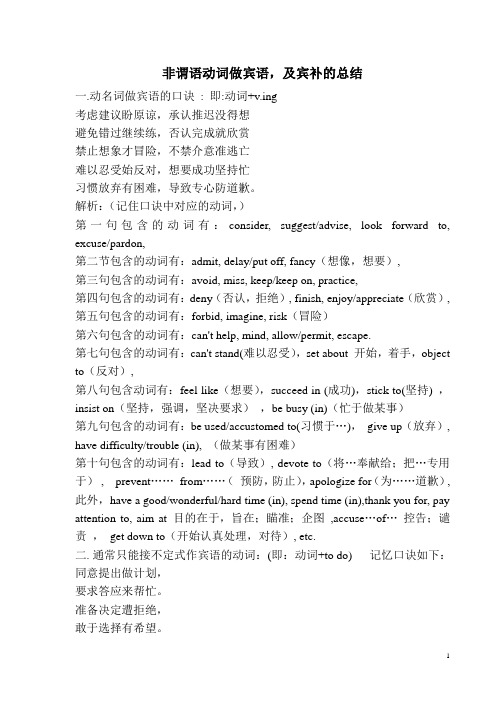
非谓语动词做宾语,及宾补的总结一.动名词做宾语的口诀: 即:动词+v.ing考虑建议盼原谅,承认推迟没得想避免错过继续练,否认完成就欣赏禁止想象才冒险,不禁介意准逃亡难以忍受始反对,想要成功坚持忙习惯放弃有困难,导致专心防道歉。
解析:(记住口诀中对应的动词,)第一句包含的动词有:consider, suggest/advise, look forward to, excuse/pardon,第二节包含的动词有:admit, delay/put off, fancy(想像,想要),第三句包含的动词有:avoid, miss, keep/keep on, practice,第四句包含的动词有:deny(否认,拒绝), finish, enjoy/appreciate(欣赏), 第五句包含的动词有:forbid, imagine, risk(冒险)第六句包含的动词有:can't help, mind, allow/permit, escape.第七句包含的动词有:can't stand(难以忍受),set about 开始,着手,object to(反对),第八句包含动词有:feel like(想要),succeed in (成功),stick to(坚持) ,insist on(坚持,强调,坚决要求),be busy (in)(忙于做某事)第九句包含的动词有:be used/accustomed to(习惯于…),give up(放弃), have difficulty/trouble (in), (做某事有困难)第十句包含的动词有:lead to(导致), devote to(将…奉献给;把…专用于), prevent……from……(预防,防止),apologize for(为……道歉), 此外,have a good/wonderful/hard time (in), spend time (in),thank you for, pay attention to, aim at 目的在于,旨在;瞄准;企图,accuse…of…控告;谴责,get down to(开始认真处理,对待), etc.二. 通常只能接不定式作宾语的动词:(即:动词+to do) 记忆口诀如下:同意提出做计划,要求答应来帮忙。
非谓语动词作定语和宾语补足语总结归纳
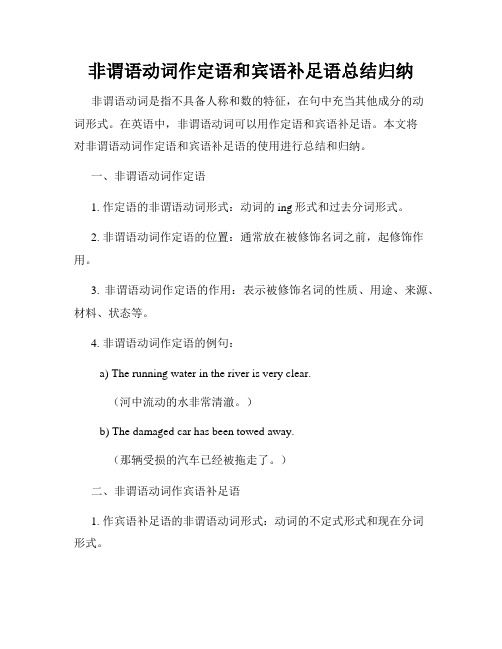
非谓语动词作定语和宾语补足语总结归纳非谓语动词是指不具备人称和数的特征,在句中充当其他成分的动词形式。
在英语中,非谓语动词可以用作定语和宾语补足语。
本文将对非谓语动词作定语和宾语补足语的使用进行总结和归纳。
一、非谓语动词作定语1. 作定语的非谓语动词形式:动词的ing形式和过去分词形式。
2. 非谓语动词作定语的位置:通常放在被修饰名词之前,起修饰作用。
3. 非谓语动词作定语的作用:表示被修饰名词的性质、用途、来源、材料、状态等。
4. 非谓语动词作定语的例句:a) The running water in the river is very clear.(河中流动的水非常清澈。
)b) The damaged car has been towed away.(那辆受损的汽车已经被拖走了。
)二、非谓语动词作宾语补足语1. 作宾语补足语的非谓语动词形式:动词的不定式形式和现在分词形式。
2. 非谓语动词作宾语补足语的位置:通常放在及物动词、系动词、感官动词、使役动词等动词后面,起补充说明作用。
3. 非谓语动词作宾语补足语的作用:用来补充说明宾语的性质、特征、目的、结果等。
4. 非谓语动词作宾语补足语的例句:a) She wants to buy a new car.(她想买一辆新车。
)b) I found the children playing happily in the garden.(我发现孩子们在花园里快乐地玩耍。
)综上所述,非谓语动词作为定语和宾语补足语在英语中的应用较为广泛。
了解和掌握非谓语动词的用法对于提高语言表达能力至关重要。
通过灵活运用非谓语动词,可以使语言表达更加准确、生动,增加文章的表现力和吸引力。
因此,在英语学习中,我们要注重对非谓语动词作定语和宾语补足语的学习和应用,提高自己的语言能力。
英语语法非谓语动词 做宾语及宾语 的口诀
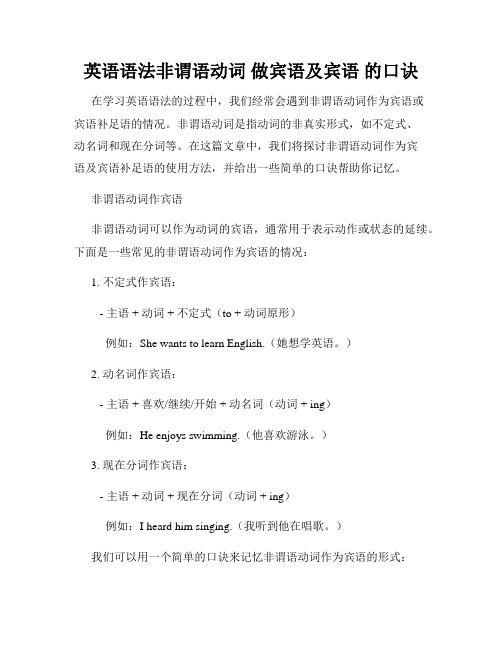
英语语法非谓语动词做宾语及宾语的口诀在学习英语语法的过程中,我们经常会遇到非谓语动词作为宾语或宾语补足语的情况。
非谓语动词是指动词的非真实形式,如不定式、动名词和现在分词等。
在这篇文章中,我们将探讨非谓语动词作为宾语及宾语补足语的使用方法,并给出一些简单的口诀帮助你记忆。
非谓语动词作宾语非谓语动词可以作为动词的宾语,通常用于表示动作或状态的延续。
下面是一些常见的非谓语动词作为宾语的情况:1. 不定式作宾语:- 主语 + 动词 + 不定式(to + 动词原形)例如:She wants to learn English.(她想学英语。
)2. 动名词作宾语:- 主语 + 喜欢/继续/开始 + 动名词(动词 + ing)例如:He enjoys swimming.(他喜欢游泳。
)3. 现在分词作宾语:- 主语 + 动词 + 现在分词(动词 + ing)例如:I heard him singing.(我听到他在唱歌。
)我们可以用一个简单的口诀来记忆非谓语动词作为宾语的形式:To 喜 ing,喜 ing,听 ing。
非谓语动词作宾语补足语除了作为宾语,非谓语动词还可以作为宾语补足语,用来补充或说明宾语的内容。
下面是一些常见的非谓语动词作为宾语补足语的情况:1. 不定式作宾语补足语:- 主语 + 动词 + 宾语 + 不定式(to + 动词原形)例如:She made him promise to come back.(她让他答应回来。
)2. 动名词作宾语补足语:- 主语 + 动词 + 宾语 + 动名词(动词 + ing)例如:I find swimming relaxing.(我发现游泳很放松。
)3. 现在分词作宾语补足语:- 主语 + 动词 + 宾语 + 现在分词(动词 + ing)例如:We saw him walking in the park.(我们看到他在公园里散步。
)我们可以用一个简单的口诀来记忆非谓语动词作为宾语补足语的形式:要爱喜 ing,喜 ing,看 ing。
英语非谓语动词用法全面归纳
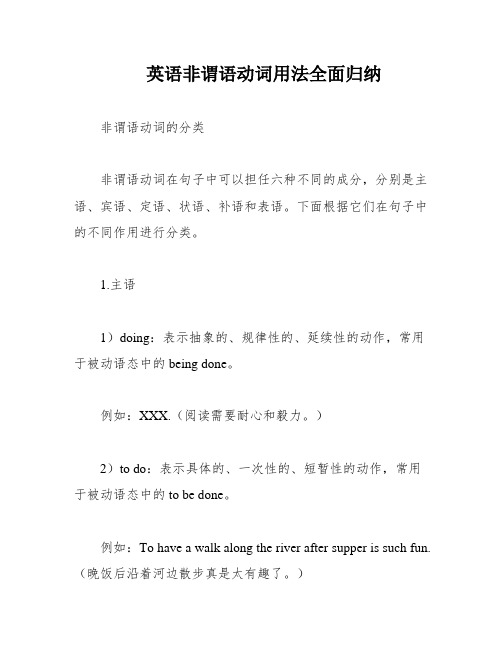
英语非谓语动词用法全面归纳非谓语动词的分类非谓语动词在句子中可以担任六种不同的成分,分别是主语、宾语、定语、状语、补语和表语。
下面根据它们在句子中的不同作用进行分类。
1.主语1)doing:表示抽象的、规律性的、延续性的动作,常用于被动语态中的being done。
例如:XXX.(阅读需要耐心和毅力。
)2)to do:表示具体的、一次性的、短暂性的动作,常用于被动语态中的to be done。
例如:To have a walk along the river after supper is such fun.(晚饭后沿着河边散步真是太有趣了。
)3)注意:①to do经常用it作形式主语替代逻辑主语放在句首,而真正的逻辑主语放在句末。
一般形式有:a。
it’s + adj + to do sth;b。
it + vt + o(宾语) + to do sth。
例如:It’s important to have a good eyesight。
as it’s known to us.(拥有良好的视力很重要,这是我们所知道的。
)It took me 3 days to finish the task.(我用了三天时间完成了这个任务。
)②it作形式主语替代doing的几个结构,如:it’s nouse/useless,it’s a waste of time,it’s no good等。
例如:It’XXX.(覆水难收。
)③范例:1)To the sun for too long contributes to the harm to the skin.A。
Being exposedB。
ExposedXXXD。
XXX解析:选A。
有可能误选B,因为可能误认为句子缺少状语,但实际上这个短语作为状语的话,句子就没有主语了。
正确的判断方法是划分句子的主谓宾。
2)动名词的复合结构:one’s doing/being done。
高考英语之非谓语动词作宾语
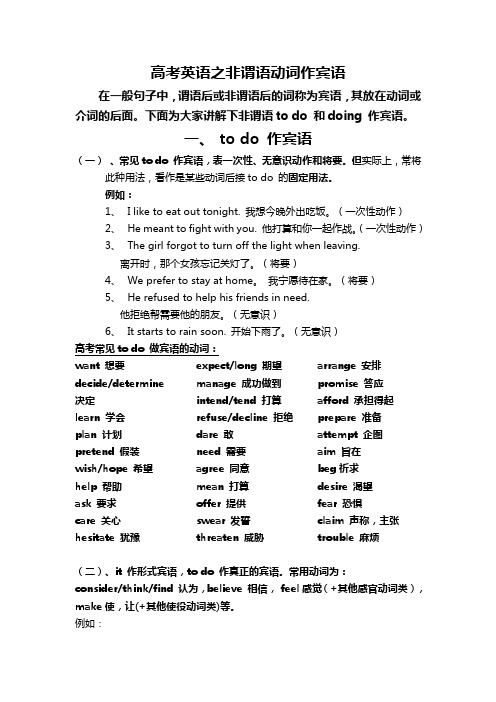
高考英语之非谓语动词作宾语在一般句子中,谓语后或非谓语后的词称为宾语,其放在动词或介词的后面。
下面为大家讲解下非谓语to do 和doing 作宾语。
一、to do 作宾语(一)、常见to do 作宾语,表一次性、无意识动作和将要。
但实际上,常将此种用法,看作是某些动词后接to do 的固定用法。
例如:1、I like to eat out tonight. 我想今晚外出吃饭。
(一次性动作)2、He meant to fight with you. 他打算和你一起作战。
(一次性动作)3、The girl forgot to turn off the light when leaving.离开时,那个女孩忘记关灯了。
(将要)4、We prefer to stay at home。
我宁愿待在家。
(将要)5、He refused to help his friends in need.他拒绝帮需要他的朋友。
(无意识)6、It starts to rain soon. 开始下雨了。
(无意识)高考常见to do 做宾语的动词:want 想要decide/determine 决定learn 学会plan 计划pretend 假装wish/hope 希望help 帮助ask 要求expect/long 期望manage 成功做到intend/tend 打算refuse/decline 拒绝dare 敢need 需要agree 同意mean 打算offer 提供arrange 安排promise 答应afford 承担得起prepare 准备attempt 企图aim 旨在beg祈求desire 渴望fear 恐惧care 关心hesitate 犹豫swear 发誓threaten 威胁claim 声称,主张trouble 麻烦(二)、it 作形式宾语,to do 作真正的宾语。
常用动词为:consider/think/find 认为,believe 相信,feel感觉(+其他感官动词类),make使,让(+其他使役动词类)等。
非谓语动词作宾语的情况
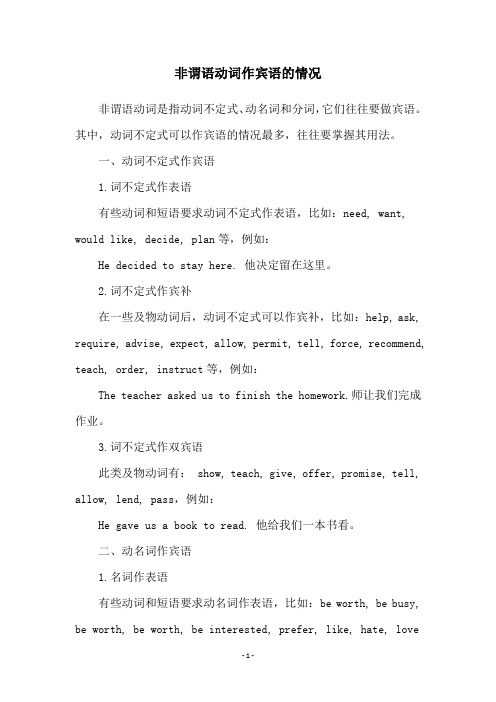
非谓语动词作宾语的情况非谓语动词是指动词不定式、动名词和分词,它们往往要做宾语。
其中,动词不定式可以作宾语的情况最多,往往要掌握其用法。
一、动词不定式作宾语1.词不定式作表语有些动词和短语要求动词不定式作表语,比如:need, want, would like, decide, plan等,例如:He decided to stay here. 他决定留在这里。
2.词不定式作宾补在一些及物动词后,动词不定式可以作宾补,比如:help, ask, require, advise, expect, allow, permit, tell, force, recommend, teach, order, instruct等,例如:The teacher asked us to finish the homework.师让我们完成作业。
3.词不定式作双宾语此类及物动词有: show, teach, give, offer, promise, tell, allow, lend, pass,例如:He gave us a book to read. 他给我们一本书看。
二、动名词作宾语1.名词作表语有些动词和短语要求动名词作表语,比如:be worth, be busy, be worth, be worth, be interested, prefer, like, hate, love等,例如:He was interested in reading books. 他喜欢看书。
2.名词作宾补动名词也可以作宾补,特别是在思考、看法、相信、知道、欢迎等动词后,有时也可以代替动词不定式,例如:We enjoy seeing them.们喜欢看到他们。
三、分词作宾语1.在分词作宾补有些及物动词后只能接现在分词作宾补,比如:catch(抓住), find(发现), listen(听见),look(看见)等,例如:She found him sleeping.发现他在睡觉。
非谓语动词作宾语,宾补
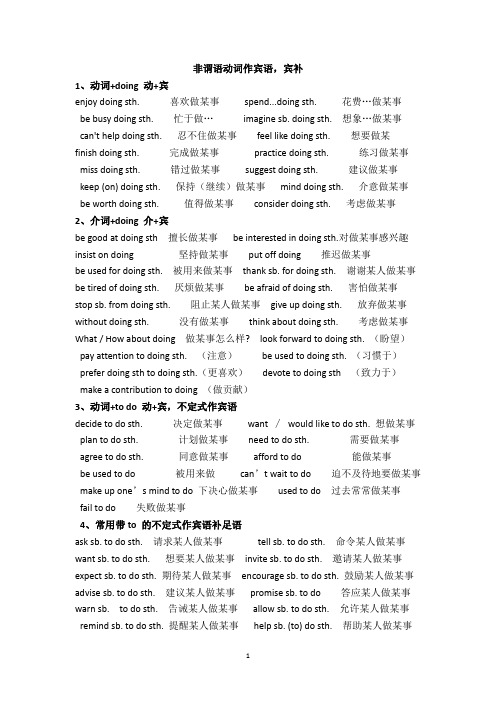
非谓语动词作宾语,宾补1、动词+doing 动+宾enjoy doing sth. 喜欢做某事spend...doing sth. 花费…做某事be busy doing sth. 忙于做…imagine sb. doing sth. 想象…做某事can't help doing sth. 忍不住做某事feel like doing sth. 想要做某finish doing sth. 完成做某事practice doing sth. 练习做某事miss doing sth. 错过做某事suggest doing sth. 建议做某事keep (on) doing sth. 保持(继续)做某事mind doing sth. 介意做某事be worth doing sth. 值得做某事consider doing sth. 考虑做某事2、介词+doing 介+宾be good at doing sth 擅长做某事be interested in doing sth.对做某事感兴趣insist on doing 坚持做某事put off doing 推迟做某事be used for doing sth. 被用来做某事thank sb. for doing sth. 谢谢某人做某事be tired of doing sth. 厌烦做某事be afraid of doing sth. 害怕做某事stop sb. from doing sth. 阻止某人做某事give up doing sth. 放弃做某事without doing sth. 没有做某事think about doing sth. 考虑做某事What / How about doing 做某事怎么样? look forward to doing sth. (盼望)pay attention to doing sth. (注意)be used to doing sth. (习惯于)prefer doing sth to doing sth.(更喜欢)devote to doing sth (致力于)make a contribution to doing (做贡献)3、动词+to do 动+宾,不定式作宾语decide to do sth. 决定做某事want ∕would like to do sth. 想做某事plan to do sth. 计划做某事need to do sth. 需要做某事agree to do sth. 同意做某事afford to do 能做某事be used to do 被用来做can’t wait to do 迫不及待地要做某事make up one’s mind to do 下决心做某事used to do 过去常常做某事fail to do 失败做某事4、常用带to 的不定式作宾语补足语ask sb. to do sth. 请求某人做某事tell sb. to do sth. 命令某人做某事want sb. to do sth. 想要某人做某事invite sb. to do sth. 邀请某人做某事expect sb. to do sth. 期待某人做某事encourage sb. to do sth. 鼓励某人做某事advise sb. to do sth. 建议某人做某事promise sb. to do 答应某人做某事warn sb. to do sth. 告诫某人做某事allow sb. to do sth. 允许某人做某事remind sb. to do sth. 提醒某人做某事help sb. (to) do sth. 帮助某人做某事5、不带to 的不定式作宾语补足语使役动词和感官动词后:feel/ hear, / let ,make, have, / see, watch, notice + sb + do/doing sth+ do表示动作的完整性,+doing 表示动作的进行性。
非谓语动词作宾语补足语的形式
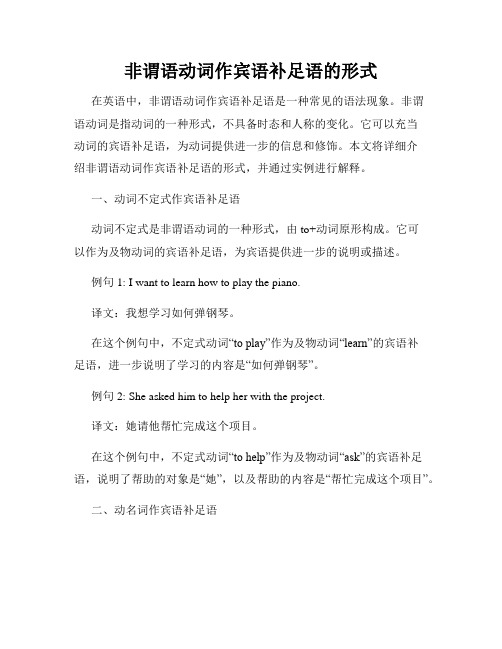
非谓语动词作宾语补足语的形式在英语中,非谓语动词作宾语补足语是一种常见的语法现象。
非谓语动词是指动词的一种形式,不具备时态和人称的变化。
它可以充当动词的宾语补足语,为动词提供进一步的信息和修饰。
本文将详细介绍非谓语动词作宾语补足语的形式,并通过实例进行解释。
一、动词不定式作宾语补足语动词不定式是非谓语动词的一种形式,由to+动词原形构成。
它可以作为及物动词的宾语补足语,为宾语提供进一步的说明或描述。
例句1: I want to learn how to play the piano.译文:我想学习如何弹钢琴。
在这个例句中,不定式动词“to play”作为及物动词“learn”的宾语补足语,进一步说明了学习的内容是“如何弹钢琴”。
例句2: She asked him to help her with the project.译文:她请他帮忙完成这个项目。
在这个例句中,不定式动词“to help”作为及物动词“ask”的宾语补足语,说明了帮助的对象是“她”,以及帮助的内容是“帮忙完成这个项目”。
二、动名词作宾语补足语动名词是非谓语动词的一种形式,由动词的现在分词形式+动名词构成。
它可以作为及物动词的宾语补足语,为宾语提供进一步的说明或描述。
例句3: He enjoys playing basketball.译文:他喜欢打篮球。
在这个例句中,动名词“playing”作为及物动词“enjoys”的宾语补足语,说明了他喜欢的活动是“打篮球”。
例句4: They spent the whole afternoon watching movies.译文:他们花了整个下午看电影。
在这个例句中,动名词“watching”作为及物动词“spent”的宾语补足语,进一步说明了他们花时间的活动是“看电影”。
三、动词过去分词作宾语补足语动词过去分词是非谓语动词的一种形式,常常由动词的过去分词形式构成。
它可以作为及物动词的宾语补足语,为宾语提供进一步的说明或描述。
非谓语动词用作宾语和宾语补足语
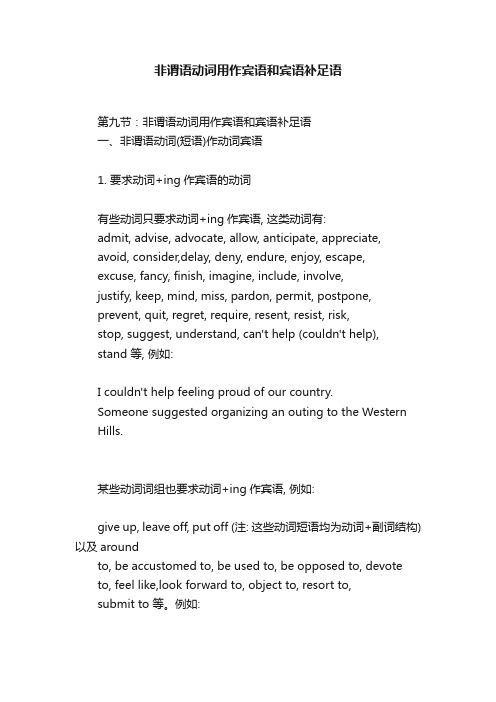
非谓语动词用作宾语和宾语补足语第九节:非谓语动词用作宾语和宾语补足语一、非谓语动词(短语)作动词宾语1. 要求动词+ing作宾语的动词有些动词只要求动词+ing作宾语, 这类动词有:admit, advise, advocate, allow, anticipate, appreciate,avoid, consider,delay, deny, endure, enjoy, escape,excuse, fancy, finish, imagine, include, involve,justify, keep, mind, miss, pardon, permit, postpone,prevent, quit, regret, require, resent, resist, risk,stop, suggest, understand, can't help (couldn't help),stand 等, 例如:I couldn't help feeling proud of our country.Someone suggested organizing an outing to the Western Hills.某些动词词组也要求动词+ing作宾语, 例如:give up, leave off, put off (注: 这些动词短语均为动词+副词结构)以及aroundto, be accustomed to, be used to, be opposed to, devote to, feel like,look forward to, object to, resort to,submit to 等。
例如:Mr. Smith gave up smoking according to his doctor'sadvice.Do you feel like having a walk with us in the woods bythe sea?Some people in the rich world are opposed to doingbusiness withpoor countries.有时在形容词后面也要求用动词+ing, 例如: busy, worth, worthwhile等。
非谓语动词用法归纳(语法
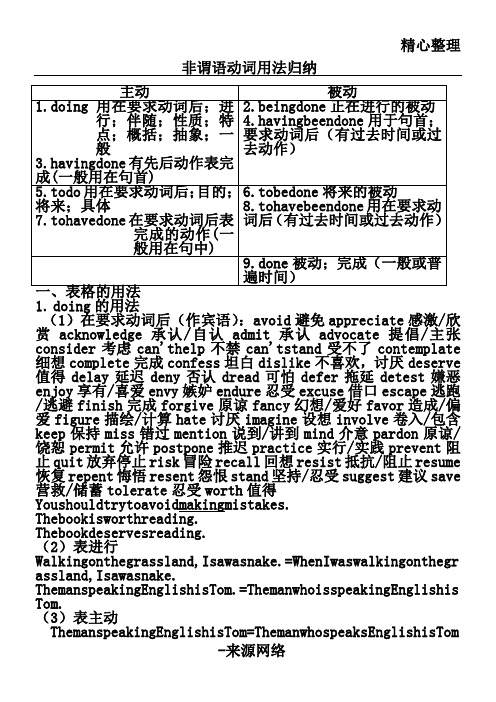
精心整理非谓语动词用法归纳/Youshouldtrytoavoidmakingmistakes. Thebookisworthreading.Thebookdeservesreading.(2)表进行Walkingonthegrassland,Isawasnake.=WhenIwaswalkingonthegr assland,Isawasnake.ThemanspeakingEnglishisTom.=ThemanwhoisspeakingEnglishis Tom.(3)表主动ThemanspeakingEnglishisTom=ThemanwhospeaksEnglishisTom.=ThemanwhospokeEnglishisTo m.Nobodydinksboilingwaterbutboiledwater.=Nobodydinkswatert hatisboilingbutthewaterthathasboiled.(4)表伴随IstandoutsidewaitingforMr.Chen. Ilieinbedreadinganovel.(5)表性质;特点((词Havingdonethework,Ihadashortrest.=AfterIhaddonethework,I hadashortrest.Havingdonethework,Iwentbackhome.Havingbeendone,theworkwascheckedbytheleaders.4.havingbeendone用于句首;有先后动作表完成有先后动作表完成,(有过去时间或过去动作)Iappreciatehavingbeengiventheopportunitytostudyabroad twoyearsago.(要求动词后)=IappreciatethatIwasgiventheopportunitytostudyabroadt woyearsago.Havingbeengiventheopportunitytostudyabroadtwoyearsago ,Istillappreciateyourhelpthen.=BecauseIwasgiventheopportunitytostudyabroadtwoyearsa go,IstillappreciateyourhelpthenIappreciatehavingbeengiventheopportunitytostudyabroad twoyearsago.IenjoygivingtheopportunitytostudyabroadtoMr.Wang.Iappreciatebeinggiventheopportunitytostudyabroadnow.得请求注定能够碰巧long忽视计划/允许try想要始干。
非谓语动词作主语和宾语
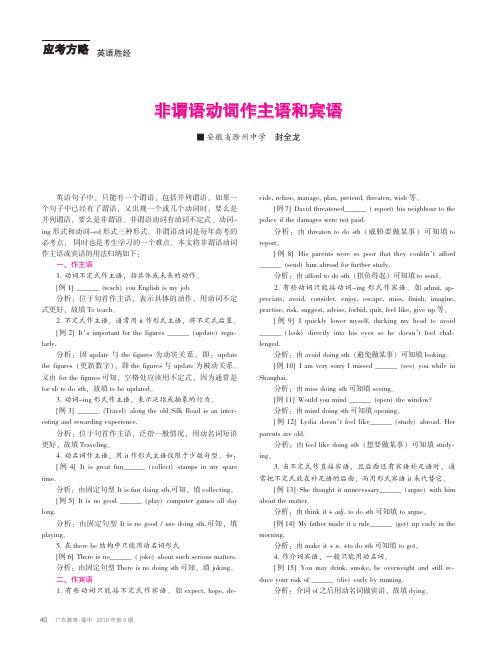
英语胜经非谓语动词作主语和宾语■安徽省滁州中学封全龙英语句子中,只能有一个谓语,包括并列谓语。
如果一个句子中已经有了谓语,又出现一个或几个动词时,要么是并列谓语,要么是非谓语。
非谓语动词有动词不定式、动词-ing形式和动词-ed形式三种形式。
非谓语动词是每年高考的必考点,同时也是考生学习的一个难点。
本文将非谓语动词作主语或宾语的用法归纳如下:一、作主语1.动词不定式作主语,指具体或未来的动作。
[例1]______(teach)you English is my job.分析:位于句首作主语,表示具体的动作,用动词不定式更好,故填To teach。
2.不定式作主语,通常用it作形式主语,将不定式后置。
[例2]It’s important for the figures______(update)regu鄄larly.分析:因update与the figures为动宾关系,即:update the figures(更新数字),即the figures与update为被动关系。
又由for the figures可知,空格处应该用不定式,因为通常是for sb to do sth,故填to be updated。
3.动词-ing形式作主语,表示泛指或抽象的行为。
[例3]______(Travel)along the old Silk Road is an inter鄄esting and rewarding experience.分析:位于句首作主语,泛指一般情况,用动名词短语更好,故填Traveling。
4.动名词作主语,用it作形式主语仅限于少数句型。
如:[例4]It is great fun______(collect)stamps in my spare time.分析:由固定句型It is fun doing sth.可知,填collecting。
[例5]It is no good______(play)computer games all day long.分析:由固定句型It is no good/use doing sth.可知,填playing。
非谓语动词作宾语的用法
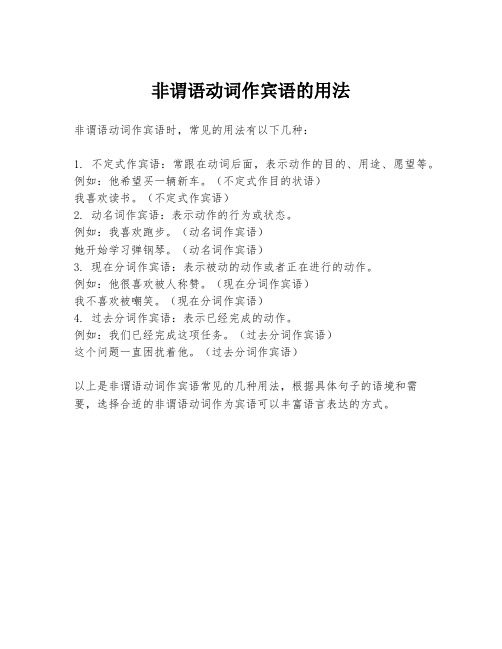
非谓语动词作宾语的用法
非谓语动词作宾语时,常见的用法有以下几种:
1. 不定式作宾语:常跟在动词后面,表示动作的目的、用途、愿望等。
例如:他希望买一辆新车。
(不定式作目的状语)
我喜欢读书。
(不定式作宾语)
2. 动名词作宾语:表示动作的行为或状态。
例如:我喜欢跑步。
(动名词作宾语)
她开始学习弹钢琴。
(动名词作宾语)
3. 现在分词作宾语:表示被动的动作或者正在进行的动作。
例如:他很喜欢被人称赞。
(现在分词作宾语)
我不喜欢被嘲笑。
(现在分词作宾语)
4. 过去分词作宾语:表示已经完成的动作。
例如:我们已经完成这项任务。
(过去分词作宾语)
这个问题一直困扰着他。
(过去分词作宾语)
以上是非谓语动词作宾语常见的几种用法,根据具体句子的语境和需要,选择合适的非谓语动词作为宾语可以丰富语言表达的方式。
非谓语动词作宾语的情况
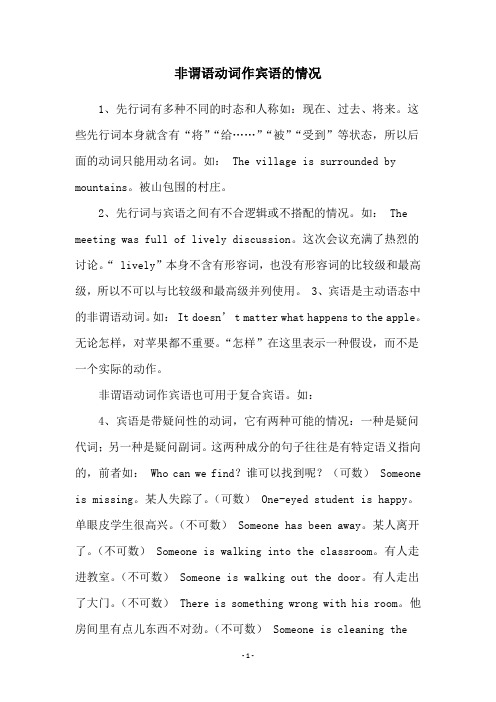
非谓语动词作宾语的情况1、先行词有多种不同的时态和人称如:现在、过去、将来。
这些先行词本身就含有“将”“给……”“被”“受到”等状态,所以后面的动词只能用动名词。
如: The village is surrounded by mountains。
被山包围的村庄。
2、先行词与宾语之间有不合逻辑或不搭配的情况。
如: The meeting was full of lively discussion。
这次会议充满了热烈的讨论。
“ lively”本身不含有形容词,也没有形容词的比较级和最高级,所以不可以与比较级和最高级并列使用。
3、宾语是主动语态中的非谓语动词。
如: It doesn’ t matter what happens to the apple。
无论怎样,对苹果都不重要。
“怎样”在这里表示一种假设,而不是一个实际的动作。
非谓语动词作宾语也可用于复合宾语。
如:4、宾语是带疑问性的动词,它有两种可能的情况:一种是疑问代词;另一种是疑问副词。
这两种成分的句子往往是有特定语义指向的,前者如: Who can we find?谁可以找到呢?(可数) Someone is missing。
某人失踪了。
(可数) One-eyed student is happy。
单眼皮学生很高兴。
(不可数) Someone has been away。
某人离开了。
(不可数) Someone is walking into the classroom。
有人走进教室。
(不可数) Someone is walking out the door。
有人走出了大门。
(不可数) There is something wrong with his room。
他房间里有点儿东西不对劲。
(不可数) Someone is cleaning thewindows。
有人在擦玻璃。
(不可数) Someone is eating something。
有人在吃东西。
非谓语动词作宾语的情况

非谓语动词作宾语的情况语言中的动词一般可以分为谓语动词和非谓语动词,但他们之间又有着许多细微的关系,其中,非谓语动词作宾语的情况也是一个值得深究的问题。
本文将针对此情况,从语法角度对其进行探讨。
一、非谓语动词作宾语的情况在英语中,非谓语动词作宾语的情况不算罕见,一般都是指用动词不定式、动名词或者动词-ing形式作宾语的情况。
比如,they enjoy listening to music(他们喜欢听音乐), I will never forget seeing the Grand Canyon(我永远都不会忘记看到大峡谷的情景)等。
二、宾语动词的意义非谓语动词作宾语的情况,主要就是指将动词不定式、动名词或者动词-ing形式用作宾语,而这种情况的出现,其实也附带着某种意义之下。
1、当动词用不定式作宾语时,通常会暗示着某种行为或者动作发生或者独立存在,比如,I saw him walking home(我看见他步行回家)里的walking home就是一个动词不定式,它暗示的是别人在作某种行动,也就是步行回家的行为。
2、当动名词作宾语的时候,通常会暗示着一种习惯性或者长期性的行为存在,比如,I like playing basketball(我喜欢打篮球)里的playing basketball就是一个动名词,它暗示的是别人有习惯性的行为,也就是经常打篮球。
3、当动词-ing形式作宾语的时候,通常会暗示着某种正在进行或者正在发生的行为,比如,I hate hearing people argue(我讨厌听人争吵)里的hearing people argue就是一个动词-ing形式,它暗示的是别人正在发生的行为,也就是人们正在争吵的行为。
三、用法实例1、当动词用不定式作宾语的时候,通常会和其他词一起使用,比如:(1)She loves to dance(她喜欢跳舞)(2)He enjoys studying in the library(他喜欢在图书馆里学习)(3)I hate to argue with people(我讨厌和人争吵)2、当动词用动名词作宾语的时候,也会和其他词一起使用,比如:(1)She likes reading books(她喜欢读书)(2)He enjoys playing basketball(他喜欢打篮球)(3)I can stand listening to people argue(我受不了听人争吵)3、当动词用动词-ing形式作宾语的时候,也会和其他词一起使用,比如:(1)She doesn mind hearing people talking(她不介意听别人说话)(2)He hates watching people fight(他讨厌看到别人打架)(3)I can stand seeing people argue(我受不了看到人们争吵)四、结论从以上讨论可以看出,非谓语动词作宾语的情况并不罕见,而且它还会伴随着某种特定的意义,比如某种行为发生、习惯性的行为存在以及正在发生的行为等。
非谓语动词作宾语知识点
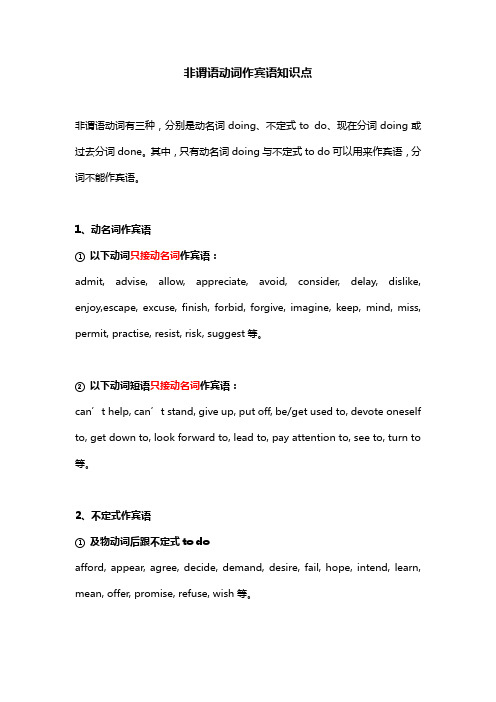
非谓语动词作宾语知识点非谓语动词有三种,分别是动名词doing、不定式to do、现在分词doing或过去分词done。
其中,只有动名词doing与不定式to do可以用来作宾语,分词不能作宾语。
1、动名词作宾语①以下动词只接动名词作宾语:admit, advise, allow, appreciate, avoid, consider, delay, dislike, enjoy,escape, excuse, finish, forbid, forgive, imagine, keep, mind, miss, permit, practise, resist, risk, suggest等。
②以下动词短语只接动名词作宾语:can’t help, can’t stand, give up, put off, be/get used to, devote oneself to, get down to, look forward to, lead to, pay attention to, see to, turn to 等。
2、不定式作宾语①及物动词后跟不定式to doafford, appear, agree, decide, demand, desire, fail, hope, intend, learn, mean, offer, promise, refuse, wish等。
②动词+疑问代(副)词+不定式to do动词:advise, decide, forget, know, learn, remember, see, tell, think, teach, wonder, discover, understand, guess, explain等。
疑问词:what, when, which, where, how,whether。
e.g. He will tell you how to deal with it.特别说明:不定式作宾语时,有时会使用it作形式宾语,然后把不定式放后面。
非谓语动词作宾语的情况
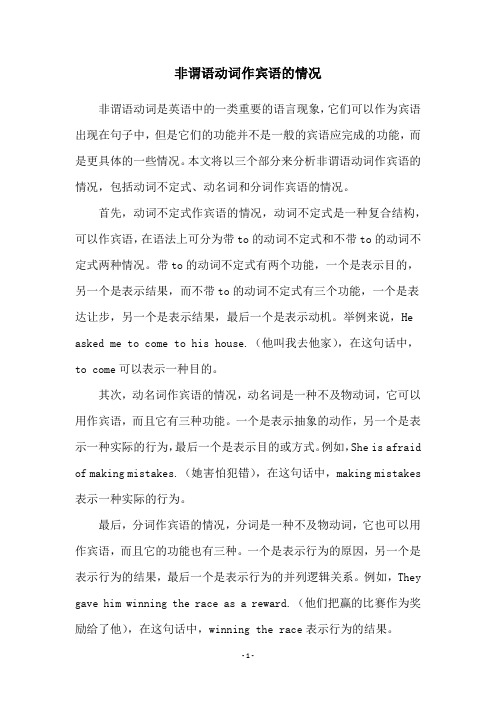
非谓语动词作宾语的情况非谓语动词是英语中的一类重要的语言现象,它们可以作为宾语出现在句子中,但是它们的功能并不是一般的宾语应完成的功能,而是更具体的一些情况。
本文将以三个部分来分析非谓语动词作宾语的情况,包括动词不定式、动名词和分词作宾语的情况。
首先,动词不定式作宾语的情况,动词不定式是一种复合结构,可以作宾语,在语法上可分为带to的动词不定式和不带to的动词不定式两种情况。
带to的动词不定式有两个功能,一个是表示目的,另一个是表示结果,而不带to的动词不定式有三个功能,一个是表达让步,另一个是表示结果,最后一个是表示动机。
举例来说,He asked me to come to his house.(他叫我去他家),在这句话中,to come可以表示一种目的。
其次,动名词作宾语的情况,动名词是一种不及物动词,它可以用作宾语,而且它有三种功能。
一个是表示抽象的动作,另一个是表示一种实际的行为,最后一个是表示目的或方式。
例如,She is afraid of making mistakes.(她害怕犯错),在这句话中,making mistakes 表示一种实际的行为。
最后,分词作宾语的情况,分词是一种不及物动词,它也可以用作宾语,而且它的功能也有三种。
一个是表示行为的原因,另一个是表示行为的结果,最后一个是表示行为的并列逻辑关系。
例如,They gave him winning the race as a reward.(他们把赢的比赛作为奖励给了他),在这句话中,winning the race表示行为的结果。
总而言之,非谓语动词作宾语的情况比较繁杂,主要有动词不定式、动名词和分词三类。
它们各自有自己特殊的功能,需要熟悉这些功能,从而更好地使用这些非谓语动词。
只有掌握了这些非谓语动词的用法,才能够在句子中表达出准确的含义,更好地传达思想。
非谓语动词作宾语的情况

非谓语动词作宾语的情况
非谓语动词是英语中一类十分重要的语言现象,英语中存在着许多非谓语动词,它们可以用于做各种句子的成分,而在某些情况下,非谓语动词也可以作宾语,受它们影响,句子的意思也会有所不同。
首先,非谓语动词可以作宾语的情况有以下三种:一是把动词短语当做句子的宾语;二是把不定式当作句子的宾语;三是把动名词当作句子的宾语。
把动词短语当作宾语,这种情况比较常见,凡是有动词短语作宾语的句子,说明动词短语是句子的宾语,它与动词是一一对应的关系。
比如,What do you think of the movie?(你对这部电影怎么看?)这句话中,think of the movie就是宾语,也是动词短语。
把不定式当作宾语,这也是一种比较常见的情况,有不定式作宾语的句子,说明不定式是句子的宾语,它与动词是一一对应的关系。
比如,I want to buy a book(我想买本书)这句话中,to buy a book 就是宾语,也是一个不定式。
把动名词当作宾语,这种情况也比较常见,有动名词作宾语的句子,说明动名词是句子的宾语,它与动词是一一对应的关系。
比如,We enjoy playing football(我们喜欢踢足球)这句话中,playing football就是宾语,也是一个动名词。
以上就是非谓语动词作宾语的情况,它们可以有效地用于改变句子的意思和语气,以此来丰富英语的句型,以更清晰地表达不同的情感,情绪和态度。
这是非谓语动词作宾语的情况,它们是英语中一种
重要而独特的语言现象,英语学习者必须牢记其用法,从而更好地掌握英语语言。
非谓语动词作宾语的口诀
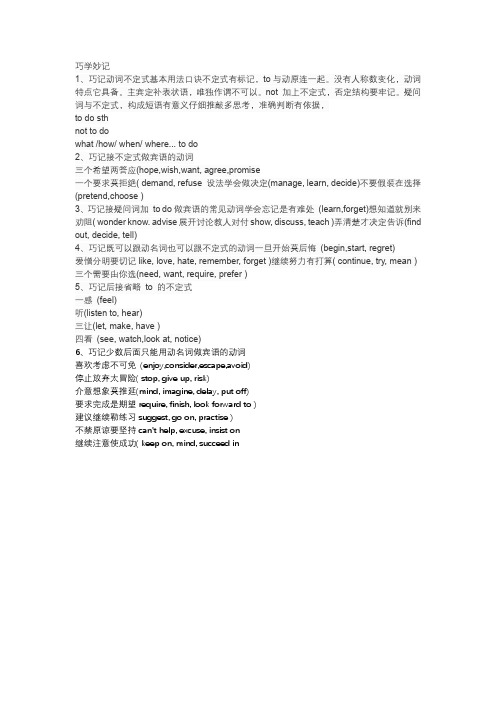
巧学妙记1、巧记动词不定式基本用法口诀不定式有标记,to与动原连一起。
没有人称数变化,动词特点它具备。
主宾定补表状语,唯独作谓不可以。
not 加上不定式,否定结构要牢记。
疑问词与不定式,构成短语有意义仔细推敲多思考,准确判断有依据,to do sthnot to dowhat /how/ when/ where... to do2、巧记接不定式做宾语的动词三个希望两答应(hope,wish,want, agree,promise一个要求莫拒绝( demand, refuse 设法学会做决定(manage, learn, decide)不要假装在选择(pretend,choose )3、巧记接疑问词加to do做宾语的常见动词学会忘记是有难处(learn,forget)想知道就别来劝阻( wonder know. advise展开讨论教人对付show, discuss, teach )弄清楚才决定告诉(find out, decide, tell)4、巧记既可以跟动名词也可以跟不定式的动词一旦开始莫后悔(begin,start, regret)爱憎分明要切记like, love, hate, remember, forget )继续努力有打算( continue, try, mean )三个需要由你选(need, want, require, prefer )5、巧记后接省略to 的不定式一感(feel)听(listen to, hear)三让(let, make, have )四看(see, watch,look at, notice)6、巧记少数后面只能用动名词做宾语的动词喜欢考虑不可免(enjoy,consider,escape,avoid)停止放弃太冒险( stop, give up, risk)介意想象莫推延(mind, imagine, delay, put off)要求完成是期望require, finish, look forward to )建议继续勒练习suggest, go on, practise )不禁原谅要坚持can't help, excuse, insist on继续注意使成功( keep on, mind, succeed in。
- 1、下载文档前请自行甄别文档内容的完整性,平台不提供额外的编辑、内容补充、找答案等附加服务。
- 2、"仅部分预览"的文档,不可在线预览部分如存在完整性等问题,可反馈申请退款(可完整预览的文档不适用该条件!)。
- 3、如文档侵犯您的权益,请联系客服反馈,我们会尽快为您处理(人工客服工作时间:9:00-18:30)。
第5讲非谓语动词作宾语的归纳教学目标:在前面非谓语动词单项选择的基础上,进行理论和实践的提高,争取在综合能力上有所突破。
不定式、分词做宾语用法要点一:下列动词只能用不定式做宾语,请牢记:decide to do , determine to do , learn to do ,want to do ,expect to do, hope to do , wish to do , refuse to do, manage to do, care to do , pretend to do , offer to do ,promise to do ,choose to do, plan to do , agree to do , ask to do , beg to do , help to do ,afford to do, strive to do, happen to do, wait to do ……当我经过时,她假装没有看见我我们约好在此见面。
二:下列动词只能用动名词做宾语,请牢记:Consider doing , suggest doing ,advise doing, look forward to doing, excuse doing, pardon doing, admit doing, delay doing, put off doing, fancy doing, avoid doing ,miss doing, keep doing, keep on doing, practise doing, deny doing, finish doing , enjoy doing , appreciate doing, forbid doing, imagine doing, risk doing , can’t help doing , mind doing, allow doing , permit doing, escape doing;Be used to doing, lead to doing, devote to doing , go back to doing, stick to doing ,object to doing, get down to doing, pay attention to doing, can’t stand doing, give up doing, feel like doing, insist on doing, thank you for doing, apologize for doing, be busy doing, have difficulty/trouble in doing, have a good time in doing, spend time in doing……他为了面试准备充分,因为他冒不起失去这个好机会的风险。
训练:1.The squirrel was so lucky that it just missed ______________(catch)2.I can hardly imagine Peter ______________(sail)across the ocean in five days.3.I would appreciate your ___________(call) back this afternoon.4.The discovery of the new evidence led to the thief ___________(catch)三:下列动词或词组既可以跟动名词做宾语,也可以跟不定式做宾语,但意义上有区别,请注意:1.forget to doforget doing2.remember to doremember doing3.regret to doregret doing4.stop todostop doing5. try to doTry doing6. mean to doMean doing7.go on to dogo on doing8.can’t help to docan’t help doing训练:1.She didn’t remember ___________(meet) him before.2.We’ve always deeply regret __________(sell) the house.3.This book can’t help ____________(learn) the language.4.---When do you plan to leave?---I mean _________(leave) tomorrow.2) 动词like, love, prefer之后接不定式或动名词做宾语均可,注意区别。
如果这几个动词前有would/should时,后面则应该接不定式做宾语。
3)allow, advise ,forbid, permit, consider后有两种形式,特别容易混淆和考察。
4)动词need ,require , want 的特殊考点。
5)be worth 和be worthy 的用法区别这个地方值得一看训练:1.He would like _______(sing) this song now.2.Do you feel like ________(have) a cup of tea?3.The extra money will allow us _______(buy) a car.4.This book is worth ____________.(read)5.This book is worthy ____________.(read)6.All cars require ____________(service) regularly.四:动词不定式在介词but, other than后面时,to 有时候可以省略,有时候不能。
请牢记We could do nothing but wait.He had no choice but to wait.另外,在can’t choose but do, can’t help but do (只好),can’t but do(只好), had better do ,would rather do ,这些句型当中的不定式也要省略to.He cannot choose but stay on .I can’t but agree to his terms. (我只好同意他的条件)五:不定式做动词tell, show, understand, explain, teach, learn, advise, discuss, ask, decide, wonder, find out 等词的宾语时,前面常带引导词how, what, whether, where, when, who等+ to do , 但是,why却要加不带to 的不定式,如:He showed us how to do the work.We must decide whether to stay or go.Can you tell me why do it?训练:If you are planning to spend your money having fun this week, better _______(forget) it-----you’ve got some big bills coming.I wonder how _________(solve) this problem.What can we do but _________(sit) and _________(wait)?配套练习:1. I like __________ very much, but I don’t like _________ this morning.A. swimming, swimmingB. to swim, to swimC. swimming, to swimD. to swim, swimming2. Little Jim should love __________ to the theatre this evening.A. to be takenB. to takeC. being takenD. taking3. ---“Did you close the door?”---“Yes, I remember __________ it.”C.closing D.closedclosingB.A.tocloseto4. Remember __________ the newspaper when you have finished it.A. putting backB. having put backC. to put backD. will put back5. I’m sorry I forgot _______ your dictionary. Let’s borrow one from Li Ming.bring D.tobringing toA.take B.taking C.6. Henry always forgets things he has done. Yesterday he forgot __________ and looked for it everywhere.A. to post the letterB. to have the letter postedC. to have posted the letterD. having posted the letter7. My brother regretted __________ a lecture given by Professor Liu.missed D.missedmiss C.beingB.A.missingto8. I regret __________ you that we are unable to offer you a job.A. informingB. having informedC. to informD. to informing9. I felt tired with walking, so I stopped __________ a break for an hour.taking D.takingtohave C.toA.having B.10. The teacher told the students to stop __________ to him.A. to write and listenB. writing and listeningC. to write and listeningD. writing and to listen11. ---“What can we do to help Li Hai.”---“All we can do is to try __________ that he ought to study more.”makingrealizerealize B.himtoA.makinghimC. to make him realizeD. to make him to realize12. You didn’t hear us come in last night. That’s good. We tried ____ noisy.A. to be notB. not to beC. not beingD. being not13. He finished his homework, then he went on __________ a letter.towritewith D.writing C.A.write B.14. The grass has grown so tall that it needs _________.A. to cutB. to be cut itC. cuttingD. being cut15. ---”You’ve come just in time to help us.”---“Fine, what needs __________?”doneD.todobetoIdo B.doneC.A.16. You didn’t need __________ him the news; it just made him sad.youwouldtellA.that telling B.tell D.tell C.to17. These young trees require __________ carefully.A. looking afterB. to look afterC. to be looked atD. looking for18. The sentence wants __________ once more.A. to explainB. explainingC. being explainedD. to be explained it19. He hasn’t got used __________ in the countryside yet.tolivingliving D.live C.toA.live B.20. A very well-known person __________ in this house.A. is used to liveB. used to liveC. is used to livingD. used to living21. The clock was beginning __________ twelve and everybody held their breath.striking D.struckstrike C.toA.strike B.22. I begin __________ the meaning, which begins __________.A. understanding, to be clearB. to understand, to be clearC. understanding, being clearD. to understand, being clear23. The police forbid __________ here.tobepark D.parked A.park B.parking C.to24. The heavy rain forbade me __________ to school.coming B.tocomemyA.fromC. comeD. my coming25. Tom’s parents do not allow Tom __________ swimming.A. goingB. to goC. goD. goes26. Sorry, we don’t allow __________ in the lecture room.A. to smokeB. smokeC. smokingD. to smoking27. Visitors are not permitted __________ the park after dark, because of the lack of lighting.A. to enterB. enteringC. to enter inD. entering in28. They don’t permit __________ noise her.making D.madeC.A.tomake B.make29. Missing the train means __________ for an hour.A. to waitB. to be waitedC. being waitedD. waiting30. I meant __________ you, but I was so busy.A. to call onB. calling onC. to call atD. calling at。
